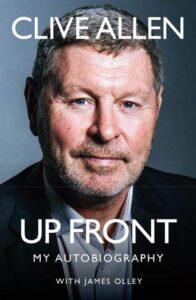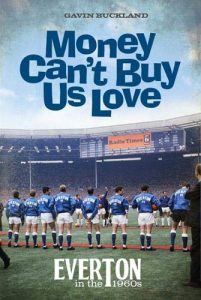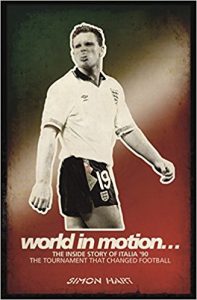 This book was originally released in Germany in 2018 with the title, Weltmeister ohne talent: Mein leben, meine karriere (World champion without talent: My life, my career) and was released in the UK a year later by deCoubertin Books after translation by Ceylan Hussein. The UK version has a different cover and in fact a different title, Per Mertesacker – BFG, Big Friendly German, My Autobiography. Of course, this is a play on the title of Roald Dahl’s children’s favourite, The BFG (Big Friendly Giant) and a nod to the Arsenal faithful who nicknamed Mertesacker, Big F***ing German, during his playing career at the Emirates.
This book was originally released in Germany in 2018 with the title, Weltmeister ohne talent: Mein leben, meine karriere (World champion without talent: My life, my career) and was released in the UK a year later by deCoubertin Books after translation by Ceylan Hussein. The UK version has a different cover and in fact a different title, Per Mertesacker – BFG, Big Friendly German, My Autobiography. Of course, this is a play on the title of Roald Dahl’s children’s favourite, The BFG (Big Friendly Giant) and a nod to the Arsenal faithful who nicknamed Mertesacker, Big F***ing German, during his playing career at the Emirates.
Structure wise the book is broken down into five main chapters, with an introduction, acknowledgments and statistics & careers notes, completing this insightful look at the current Head of the Arsenal Academy.
From the off the reader is given a clue that this is not going to be a run-of-the-mill football autobiography, as Mertesacker details in the brief introduction (cunningly titled, The End) the struggles he had as a 15 year-old in the Hannover youth set-up with pain, that prevented him from playing and training. The closing sentence provides an interesting perspective on the young Mertesacker – “My dream of becoming a professional footballer hadn’t been destroyed: I never had it.”
 There follows the four biggest chapters of the book which are organised into, Pattensen, which looks at his childhood, his parents and his pride of his hometown and his roots, Bundesliga, covering his playing career at Hannover 96 and Werder Bremen, Premier League, as Mertesacker moved to Arsenal in 2011 and Welmeister, focusing on his time with the German national team, culminating in winning a World Cup winners medal in 2014. The fifth chapter, The Beginning, neatly brings the reader up to date with Mertesacker in post at the Arsenal Academy and a reflective piece on his time as a young player, compared to that of the Academy players of today.
There follows the four biggest chapters of the book which are organised into, Pattensen, which looks at his childhood, his parents and his pride of his hometown and his roots, Bundesliga, covering his playing career at Hannover 96 and Werder Bremen, Premier League, as Mertesacker moved to Arsenal in 2011 and Welmeister, focusing on his time with the German national team, culminating in winning a World Cup winners medal in 2014. The fifth chapter, The Beginning, neatly brings the reader up to date with Mertesacker in post at the Arsenal Academy and a reflective piece on his time as a young player, compared to that of the Academy players of today.
The logic of organising the chapters is evident, however, the lack of subdivision in them, and the occasions where the narrative drifts into a stream of consciousness on certain topics, can be a challenge to the reading experience. Additionally the separating of the playing career between club and country, whilst again logical, can leave tying the two together a little problematic.
Nevertheless, Honigstein manages to capture both the highlights of the 104 cap German international’s career, but also more interestingly a view into the character of Mertesacker. A player who suffered both physical issues which blighted and ultimately ended his career, and his mental issues in dealing with the stresses and strains of playing at the highest level and self-doubt of his abilities. Mertesacker comes across as a person who made the most of his talent, although possibly never getting fully the credit he deserved for his cultured playing style but was willing to explore various avenues to get the very best out of himself and those around him.
Mertesacker emerges as a thoughtful and thoroughly decent character and his description at the shock and subsequent attempts to understand the tragic suicide of fellow one-time club mate and international, Robert Enke, shows a real depth of compassion for a person he considered a friend and confidante, and which as a reader was a privilege to share.
A German legend for sure, but maybe with something of the English in his self-deprecating manner, as illustrated by the title of the German version of his autobiography and this quote emanating from the 2014 World Cup Final victory by Germany over Argentina, “Life isn’t always fair: Lionel Messi might never win the World Cup. Instead, he had to watch some blond beanpole, who should have stuck to swimming, leave the Maracanã with the trophy.”
(deCoubertin Books, September 2019. Hardcover 250pp)
 Clive Allen is one of the finest goalscorers of his generation but arguably his biggest battle has been to prove himself the best in his own family.
Clive Allen is one of the finest goalscorers of his generation but arguably his biggest battle has been to prove himself the best in his own family. A career in football is hard enough to achieve on your own, but when you are from a football family, then the pressure must be immense. For Clive Allen, that must have been monumental, with his father, Les, part of the Tottenham Hotspur’s team that did the ‘double’ in winning the First Division title and FA Cup in 1960/61, and a younger brother, Bradley and two cousins, Martin and Paul, who also went on to have professional careers in the game.
A career in football is hard enough to achieve on your own, but when you are from a football family, then the pressure must be immense. For Clive Allen, that must have been monumental, with his father, Les, part of the Tottenham Hotspur’s team that did the ‘double’ in winning the First Division title and FA Cup in 1960/61, and a younger brother, Bradley and two cousins, Martin and Paul, who also went on to have professional careers in the game. This book was originally released in Germany in 2018 with the title, Weltmeister ohne talent: Mein leben, meine karriere (World champion without talent: My life, my career) and was released in the UK a year later by deCoubertin Books after translation by Ceylan Hussein. The UK version has a different cover and in fact a different title, Per Mertesacker – BFG, Big Friendly German, My Autobiography. Of course, this is a play on the title of Roald Dahl’s children’s favourite, The BFG (Big Friendly Giant) and a nod to the Arsenal faithful who nicknamed Mertesacker, Big F***ing German, during his playing career at the Emirates.
This book was originally released in Germany in 2018 with the title, Weltmeister ohne talent: Mein leben, meine karriere (World champion without talent: My life, my career) and was released in the UK a year later by deCoubertin Books after translation by Ceylan Hussein. The UK version has a different cover and in fact a different title, Per Mertesacker – BFG, Big Friendly German, My Autobiography. Of course, this is a play on the title of Roald Dahl’s children’s favourite, The BFG (Big Friendly Giant) and a nod to the Arsenal faithful who nicknamed Mertesacker, Big F***ing German, during his playing career at the Emirates. There follows the four biggest chapters of the book which are organised into, Pattensen, which looks at his childhood, his parents and his pride of his hometown and his roots, Bundesliga, covering his playing career at Hannover 96 and Werder Bremen, Premier League, as Mertesacker moved to Arsenal in 2011 and Welmeister, focusing on his time with the German national team, culminating in winning a World Cup winners medal in 2014. The fifth chapter, The Beginning, neatly brings the reader up to date with Mertesacker in post at the Arsenal Academy and a reflective piece on his time as a young player, compared to that of the Academy players of today.
There follows the four biggest chapters of the book which are organised into, Pattensen, which looks at his childhood, his parents and his pride of his hometown and his roots, Bundesliga, covering his playing career at Hannover 96 and Werder Bremen, Premier League, as Mertesacker moved to Arsenal in 2011 and Welmeister, focusing on his time with the German national team, culminating in winning a World Cup winners medal in 2014. The fifth chapter, The Beginning, neatly brings the reader up to date with Mertesacker in post at the Arsenal Academy and a reflective piece on his time as a young player, compared to that of the Academy players of today.
 It’s probably because so much is hinted at in the title that he couldn’t resist the temptation. Plus there is a striking cover picture of Gazza, as I recall. A successful book, like a baited hook, attracts and then captures the reader. I think it could be true in this case but I really don’t know yet since someone has got my review copy and won’t give it back!
It’s probably because so much is hinted at in the title that he couldn’t resist the temptation. Plus there is a striking cover picture of Gazza, as I recall. A successful book, like a baited hook, attracts and then captures the reader. I think it could be true in this case but I really don’t know yet since someone has got my review copy and won’t give it back!